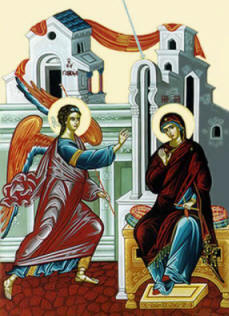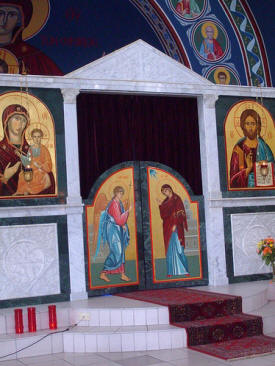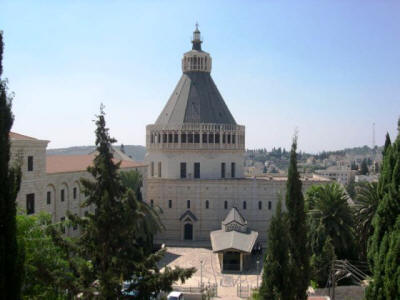
The Annunciation of the Theotokos - March 25th
The Feast of the Annunciation is one of the earliest Christian feasts,
and was already being celebrated in the fourth century. The Greek and
Slavonic names for the Feast may be translated as “good tidings.” This,
of course, refers to the Incarnation of the Son of God and the salvation
He brings. The background of the Annunciation is found in the Gospel of
St. Luke (1:26-38). The Troparion describes this as the “beginning of
our salvation, and the revelation of the eternal mystery,” for on this
day the Son of God became the Son of Man.
There are two main components to the Annunciation: the message itself,
and the response of the Virgin. The message fulfills God’s promise to
send a Redeemer (Genesis 3:15): “I will put enmity between you and the
woman, between your seed and her seed; he shall crush your head, and you
shall lie in wait for his heel.” The Fathers of the Church understand
“her seed” to refer to Christ. The prophets hinted at His coming, but
the Archangel Gabriel proclaimed that the promise is about to be
fulfilled.

The Archangel Gabriel was sent by God to Nazareth in Galilee. There he
spoke to the undefiled Virgin who was betrothed to St. Joseph: “Hail,
thou who art highly favored, the Lord is with thee: blessed art thou
among women. And, behold, thou shalt conceive in thy womb, and bring
forth a son, and shalt call his name Jesus. He shall be great, and shall
be called the Son of the Most High: and the Lord God shall give unto him
the throne of his father David. And he shall reign over the house of
Jacob forever; and of his kingdom there shall be no end.”
In contrast to Eve, who was readily deceived by the serpent, the Virgin
did not immediately accept the Angel’s message. In her humility, she did
not think she was deserving of such words, but was actually troubled by
them. The fact that she asked for an explanation reveals her sobriety
and prudence. She did not disbelieve the words of the angel, but could
not understand how they would be fulfilled, for they spoke of something
which was beyond nature. “Then said Mary unto the angel, How shall this
be, seeing I know not a man?” (Luke 1:34).
“And the angel answered and said unto her, the Holy Ghost shall come
upon thee, and the power of the Most High shall overshadow thee:
therefore also that which shall be born of thee shall be called the Son
of God. And, behold, thy cousin Elizabeth hath also conceived a son in
her old age: and this is the sixth month with her, who was called
barren. For with God nothing shall be impossible. And Mary said, ‘Behold
the handmaid of the Lord; be it unto me according to thy word.’ And the
angel departed from her” (Luke 1: 35-38).
The Annunciation falls during the Great Fast- Lent, but it is always
celebrated with great joy. The Vesperal Liturgy of St. John Chrysostom
is served, even on the weekdays of Lent. The Annunciation of the
Theotokos is an annunciation of the human race, good news that the Son
and Word of God incarnated. This universal feast must aid in a personal
feast, in a personal annunciation. We must accept the preludes of our
salvation, which is the greatest notification in our life.

Copyright 2019.St. George UGCC. All Rights Reserved.